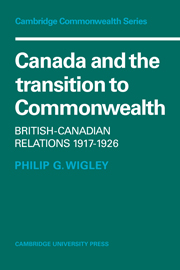Book contents
- Frontmatter
- Contents
- Abbreviations
- Preface
- Introduction
- 1 The threshold of responsibility, 1900–1916
- 2 New departures, 1917–1918
- 3 The settlement of peace, 1919
- 4 Unity and equality, 1919–1921
- 5 The centre cannot hold
- 6 Canadian diplomacy and Imperial diplomacy: 1923
- 7 From Lausanne to Locarno
- 8 The 1926 Imperial Conference: equality defined
- Conclusion
- Bibliography
- Index
- Frontmatter
- Contents
- Abbreviations
- Preface
- Introduction
- 1 The threshold of responsibility, 1900–1916
- 2 New departures, 1917–1918
- 3 The settlement of peace, 1919
- 4 Unity and equality, 1919–1921
- 5 The centre cannot hold
- 6 Canadian diplomacy and Imperial diplomacy: 1923
- 7 From Lausanne to Locarno
- 8 The 1926 Imperial Conference: equality defined
- Conclusion
- Bibliography
- Index
Summary
In the spring of 1927 two of the more elderly statesmen of empire, born within a year of each other in the late 1840s, shared their thoughts on the nature and meaning of the constitutional conclusions that had emerged from the 1926 Imperial Conference. From Canada, it appeared to Sir George Foster that there was no real cause for alarm or despondency:
We are discussing in Canada the results of the Imperial Conference, and have come, I think generally, to the conclusion that nothing new has taken place, but are confirmed in the view that special efforts must hereafter be made to link together in sentiment and co-operation the various parts of the Empire, clustering around and converging towards the greatest possible imperial unity.
In reply Arthur Balfour could do no more than add his own assurances in the same vein:
As regards the Imperial Conference, you are perfectly right; – nothing new has been done; and I have for many years held, and publicly expressed, the views embodied in our report. But though the facts are as they have long been, the result of the Report no doubt brings their truer character home to many on both sides of the Atlantic who did not thoroughly realize the situation.
For Foster and Balfour, perhaps in the long view across the immense changes from early Victorian, pre-Confederation days the period that has been studied here genuinely did appear as one of ordered stability, with the dominions in their settled and autonomous courses all the while.
- Type
- Chapter
- Information
- Canada and the Transition to CommonwealthBritish-Canadian Relations 1917–1926, pp. 278 - 283Publisher: Cambridge University PressPrint publication year: 1977



